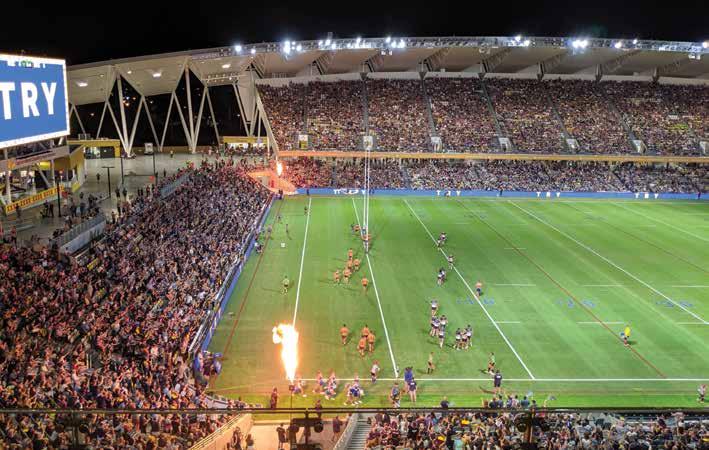Jennifer Barker helping students (above) and programs at Bankstown Senior College (opposite).
Wellbeing for all
Jennifer Barker introduces Collective Leisure and its focus on wellbeing for the most disadvantaged in society ith people’s lack of well-being in some cultures on the rise, the W foundation of Collective Leisure aims to make sure some of the most vulnerable don’t get left behind. With a purpose to enabling ‘wellbeing without boundaries’, the business was founded in September 2019 by experienced aquatic, community and recreation professional David Burns (previously of Belgravia Leisure and before that City of Sydney and Penrith City Council) and myself. Collective Leisure is a social purpose business whose programs and services use a systems approach to achieve ‘whole of person’ well-being, to tackle issues such as chronic disease and mental health. As Burns explains “we form cross sector partnerships working with local government, education, public health and the third sector, bringing many people and organisations together, to leverage our full potential through collective impact.” The business was born out of personal drive to have a greater impact, specifically in low and middle-income communities, where the majority of lifestyle-related deaths occur. Having grown up in a low-income family, losing his father at 46 to a chronic disease
and supporting his mother with Chronic obstructive pulmonary disease, Burns has always been driven to help the most disadvantaged in society. From his work in the UK with the Football Association, setting up football programs to reach youths; to breaking down cultural barriers between staff and patrons at Auburn Ruth Everuss Aquatic Centre; by setting up a funded training program to get refugee students from Bankstown Senior College into employment. This relationship with Bankstown Senior College and the unique combination of skills between Burns and I led to Collective Leisure being the first choice for the College when looking for help with the well-being of their students. The teachers at the college had become increasingly concerned with the lack of self-care their students were displaying and the increasing amount of stress they were experiencing. Specifically, they became aware that the students were: consuming high amounts of energy drinks; eating junk food regularly; not taking part in any physical exercise; complaining about feeling stressed and tired; managing their finances poorly; smoking regularly and had a lack of awareness when it came to sea and sun safety. The College felt they had a duty of
54 Australasian Leisure Management Issue 138
care to address these issues with the students, to remind them of the basics of healthy living and to raise their awareness of different aspects of their life that can impact their well-being. This was especially important for them given that many of the students have suffered trauma and had to live in a transition stage in another country (refugee camp or precarious living) for three to five years before being allowed to live in Australia. Maria Pascalis EAL/D (English is an additional language or dialect) teacher and refugee contact office at Bankstown Senior College, explains “our students with 86% of them from refugee backgrounds, have suffered torture and trauma and although they are quite resilient they still need to be reminded about the important aspects of life and well-being.” The College identified 52 year 10 students (being of age 16-22 years at the College) as their most vulnerable group. Their requirements were three weekly sessions for a duration of four hours each. They asked for the program to address nutrition; the importance of physical activity; emotional wellbeing; money management; sun and beach safety and the impacts of smoking. The program was to be delivered in ‘simple’ language, with interactive and engaging activities and practical guidance to help students implement what they learn into their lives. We designed the program based on three principles. Firstly, we wanted to share with the students things that we have taught ourselves about wellness that we wished we had been taught in school or college. Things that we knew would be so powerful for the students in their situation such as meditation and the effects of physical activity on the brain and body. Secondly, we only share things that we have implemented or tried in our own lives so we could speak from experience and not just theory. This ensured we were being authentic which was very important to us. Thirdly, that everything we share was backed by evidence that it worked and not just from a personal perspective. Based on the varied requirements of the college and our personal experience, we decided to structure the program around Zig-Ziglars ‘wheel of Life’, which we adapted to create the ‘wheel of wellbeing’. The wheel is designed to create awareness of all aspects of a person’s life that contribute to their well-being. When you are not feeling your best, you can use the wheel to become aware of aspects of your life you may be neglecting. You then know where to apply your attention and energy to
















